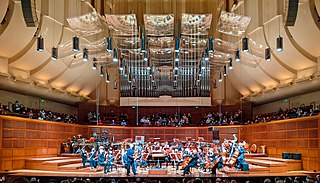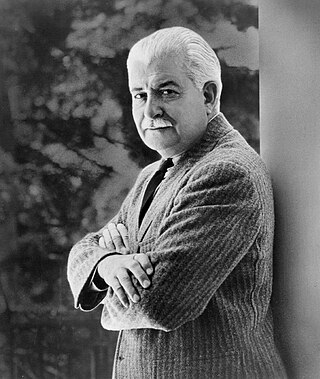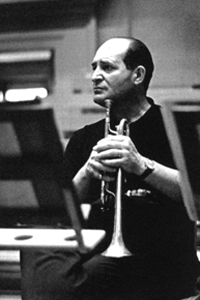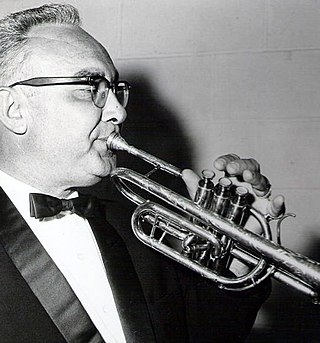
The San Francisco Symphony (SFS), founded in 1911, is an American orchestra based in San Francisco, California. Since 1980 the orchestra has been resident at the Louise M. Davies Symphony Hall in the city's Hayes Valley neighborhood. The San Francisco Symphony Youth Orchestra and the San Francisco Symphony Chorus (1972) are part of the organization. Michael Tilson Thomas became the orchestra's music director in 1995, and concluded his tenure in 2020 when Esa-Pekka Salonen took over the position.

The Boston Pops Orchestra is an American orchestra based in Boston, Massachusetts, specializing in light classical and popular music. The orchestra's current music director is Keith Lockhart.

Arthur Fiedler was an American conductor known for his association with both the Boston Symphony and Boston Pops orchestras. With a combination of musicianship and showmanship, he made the Boston Pops one of the best-known orchestras in the United States. Fiedler was sometimes criticized for over-popularizing music, particularly when adapting popular songs or editing portions of the classical repertoire, but he kept performances informal and sometimes self-mocking to attract a bigger audience.

Serge Koussevitzky, born Sergey Aleksandrovich Kusevitsky was a Russian-born conductor, composer and double-bassist, known for his long tenure as music director of the Boston Symphony Orchestra from 1924 to 1949.

Howard Harold Hanson was an American composer, conductor, educator, music theorist, and champion of American classical music. As director for 40 years of the Eastman School of Music, he built a high-quality school and provided opportunities for commissioning and performing American music. In 1944, he won a Pulitzer Prize for his Symphony No. 4, and received numerous other awards including the George Foster Peabody Award for Outstanding Entertainment in Music in 1946.

Leroy Anderson was an American composer of short, light concert pieces, many of which were introduced by the Boston Pops Orchestra under the direction of Arthur Fiedler. John Williams described him as "one of the great American masters of light orchestral music."
"Blue Tango" is an instrumental composition by Leroy Anderson, written for orchestra in 1951 and published in 1952. It was later turned into a popular song with lyrics by Mitchell Parish. Numerous artists have since covered "Blue Tango".

Roger Louis Voisin was an American classical trumpeter. In 1959, The New York Times called him "one of the best-known trumpeters in this country."
Georges C. Mager (1885–1950) was a French musician, and principal trumpet with the Boston Symphony Orchestra from 1919 until his death in 1950. He was a renowned trumpeter in Paris before the First World War, playing at the Paris Opera, Concerts Lamoureux, and the Concerts of the Society of the Conservatory. He also had an alternate career as a singer in the duo with his wife Claire, a well-known soprano, and had hoped for an operatic career. After serving in the French army during the war he came to America as flugelhorn soloist with the Garde Republicaine Band and was engaged to play in the Boston Symphony, first as a violist, since there was no vacancy for trumpet, sharing a stand with Arthur Fiedler. He assumed the first trumpet position in 1920. Trained in France, he was a student of J. Mellet at the Paris Conservatory. He was an advocate of use of the C trumpet as an orchestral instrument and had great influence on its development and acceptance in America, working most notably with Vincent Bach. He also was the first trumpeter in America to play Bach's Brandenburg Concerto in the original high tessitura. Mager was on the faculty of the New England Conservatory, and was a teacher to some of the most influential trumpeters of the mid-twentieth century, including Adolph Herseth, Roger Voisin (who replaced Mager as principal trumpet of the Boston Symphony Orchestra in 1950, Bernard Adelstein, Irving Sarin, and Renold Schilke. He was also teacher to jazz trumpeter Leon Merian.
"The Syncopated Clock" is a piece of light music by American composer Leroy Anderson, which has become a feature of the pops orchestra repertoire.

Gaston Dufresne was the principal bassist in the Boston Symphony Orchestra from 1927 to 1957 and with the Florida West Coast Symphony from 1963 to 1979. He also taught solfège, a singing technique used to teach pitch. Among his contrabass students were American composer Leroy Anderson and Boston Symphony principal trumpeter Roger Voisin. Dufresne taught solfège to Voisin and to Boston Symphony hornist Richard Mackey.
"Sleigh Ride" is a light orchestra standard composed by Leroy Anderson. The composer had formed the original idea for the piece during a heat wave in July 1946, and he finished the work in February 1948. Its first performance was by the Boston Pops, Arthur Fiedler conducting, on 7 June 1948. The original recordings were instrumental versions. The lyrics, about riding in a sleigh and other fun wintertime activities, were written by Mitchell Parish in 1950. Anderson also made arrangements for wind band and piano.
Fiddle-Faddle is a musical composition in 2/2 time composed by Leroy Anderson. It is considered to be a "light" classical music composition, sometimes referred to as "classical pops" music.
Alexander Arutunian’s Trumpet Concerto in A♭ major (1950) is the Armenian composer's sixth major composition, a "virtuoso showpiece" composed in 1949-1950. According to J. Sundram, "it is an energetic powerhouse of Eastern European lyricism and harmonic textures".
The Symphony No. 2 in D-flat major, Opus 30, W45, "Romantic", was written by Howard Hanson on commission from Serge Koussevitzky for the 50th anniversary of the Boston Symphony Orchestra in 1930, and published by Carl Fischer Music.

"The Typewriter" is a short composition of light music by American composer Leroy Anderson, which features an actual typewriter as a percussion instrument.
Newton Hart Wayland was an American orchestral conductor, arranger, composer and keyboardist. The product of an elite musical education, Wayland was known for his dedication to performing for the broadest possible audience.
John Elwood Price was an American composer, pianist, ethnomusicologist, and music teacher. He composed approximately 600 musical works in a wide variety of genres. His works are widely performed in the United States by professional groups.

James Francis Burke was an American cornet soloist. He was the principal cornet soloist with the Goldman Band from 1943 to 1974. He was also the principal trumpet with The Baltimore Symphony Orchestra from 1943 to 1949. Mr. Burke, who had the use of only one arm, was considered the greatest virtuoso of his time on the instrument, according to Ainslee Cox, conductor of the Guggenheim Memorial Band.

For Players Only is a live album by violinist and composer Leroy Jenkins, his first as a leader. It was recorded in January 1975 at Wollman Auditorium, Columbia University in New York City, and was released by JCOA Records later that year. On the album, Jenkins is joined by members of the Jazz Composer's Orchestra.










